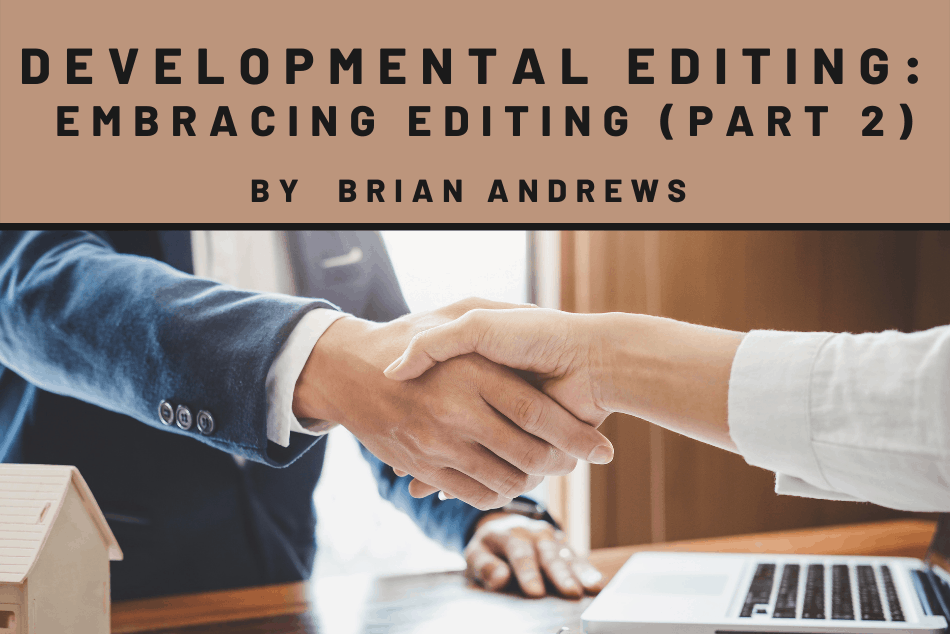In Part 1 of this series, we discussed self-editing techniques that every author should use while writing a rough draft. In Part 2, we will discuss a collaborative process known in the industry as developmental editing. The purpose of the developmental edit is for an experienced editor to provide detailed, all-encompassing feedback as well as honest, constructive counsel to the author.
While some authors might liken the process to a flogging, I do not. In fact, I consider developmental editing as one of the best perks of being traditionally published. I say this because the services of a developmental editor do not come cheap and fall outside the budget of most aspiring authors. To become a truly great author, you must experience a developmental edit firsthand at least once in your career and learn from it.
What The Heck Are Developmental Editors Anyway?
In short, developmental editors are professional book editors. In the past they worked on staff at publishing houses, but these days more and more developmental editors are freelancers. Developmental editors are story mavens and genre experts. They are more well-read than you, are intimately aware of industry trends, and typically have insider knowledge of potentially genre-busting books that are in the pre-publication pipeline.
The purpose of the developmental edit is for an experienced editor to provide detailed, all-encompassing feedback as well as honest, constructive counsel to the author.
What Value to Developmental Editors Bring to the Table?
A good developmental editor typically has a much deeper knowledge of the “craft” of story-telling. They understand writing mechanics such as the three-act structure, POV, how and when to use prologues, suspension of disbelief, the use of foreshadowing and subtext, proper application of beats and tags, et cetera, et cetera, et cetera.
They know what sells and what doesn’t, but more importantly they know why.
Equally important, experienced developmental editors have a longitudinal perspective of the industry. They’ve worked with acclaimed authors on blockbusters and equally talented unknown authors whose books have flown unnoticed under the radar. They know how genre novels have evolved over time. They know what sells and what doesn’t, but more importantly they know why. This type of insight is invaluable to any author and why you should trust their opinions.
What Do Developmental Editors Do?
In a nutshell, a good developmental editor makes your book better…sometimes MUCH better. That’s because every author has blindspots, biases, and bad habits. It takes a second set of eyes, often very experienced eyes, to identify those things in a manuscript.
The following is a list I compiled of the things I think a good developmental editor will do for you:
(1) Save you from making a potentially catastrophic error
(2) Help you find plot holes and/or inconsistencies you’ve overlooked
(3) Make sure you deliver on the novel’s payoff
(4) Make sure your vision for the novel is both clearly and effectively executed
(5) Get the book into commercial shape. The market has certain expectations that are not always obvious to new writers and a good DE will call them out.
(6) Help you trim the proverbial fat (i.e., identifying and cutting redundancies, elements that are not germane to the story, self-important and/or obnoxious prose, and the boring bits)
(7) Help you develop and draw out your characters personalities on the page, punch up your dialogue, and provide a litmus test for anything you’ve written that could be potentially politically sensitive or offensive.
What Is the Author’s Role in the Process?
Here comes the “tough love” part of this article. Your role in the developmental editing process is every bit as important as your developmental editor, but in some ways it’s the harder one. Your job, dear author, is to lock your ego in a box and resist every defensive impulse in your writer’s body until the DE is finished.
After spending months (or years) writing your masterpiece, it’s no easy task to listen to someone critique, question, and second guess your work. I get it, nobody likes to hear their baby called ugly, but trust me that’s not what’s happening here. The developmental editor has nothing but your best interests at heart. Your goals are aligned—to deliver the cleanest, most compelling manuscript possible to the publisher.
You are going to need to make changes you don’t want to. You are going to have to delete prose that you love. And you are going to need to compromise on certain plot or character elements you don’t really want to compromise on. To do this requires trust, humility, and a recognition that you did not write a perfect manuscript. Every story can be made better and that’s the purpose of the developmental edit. Trust the process, and I promise you’ll thank me for it.
We’d love to hear your thoughts on Developmental Editing…let’s continue the conversation on Facebook.

